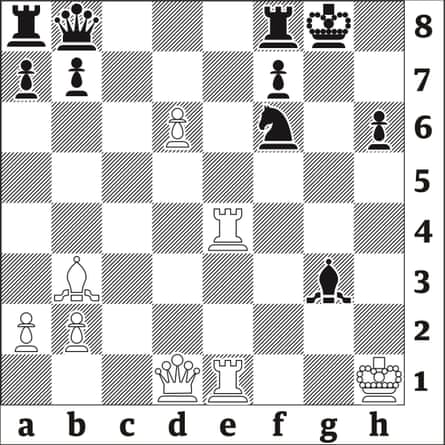The ongoing $2m, 206-player World Cup in Goa, India, has a brutal format designed to maximise the chance of shock results. Its knockout matches consist of the best of just two classical games, followed by rapid and blitz tiebreaks at increasingly fast speeds, then a final Armageddon game where White has more time but is obliged to win. The major incentive besides the prize money is three places in the 2026 Candidates, the pathway to the world title.
The Russia No 1, Ian Nepomniachtchi, who twice played for the global crown, the USA’s world No 8, Wesley So, and Hans Niemann, who has huge ambitions, were the high profile casualties in Thursday’s second round of 128, which was the first round for the top 50 seeds. After losing to the little-known Indian Diptayan Ghosh, Nepomniachtchi posted a laconic message: “There’s nothing to say about the chess part. Goa is one of those places you don’t feel sad about leaving.”
It was worse for So, who resigned against the Lithuanian Titas Stremavicius in a drawn position where the American GM overlooked a hidden stalemate resource. Niemann was outplayed by Italy’s Lorenzo Lodici, so will have to postpone his ambition to become the first US world champion since Bobby Fischer until at least 2028.

In contrast the British champion, Michael Adams, 53, the oldest player among the last 64, advanced to the next round with a 6-4 total, defeating Bulgaria’s Ivan Cheparinov, the man who refused to shake Nigel Short’s hand at the start of their game at Wijk aan Zee 2008, was forfeited, but on appeal was allowed a replay, which Short won convincingly. The YouTube recording of the incident has been viewed over 300,000 times.
Adams had chances to convert earlier in the match, but the opportunities slipped past. However, when it came to the two 3+2 blitz games, he was dominant, outclassing his rival with subtle strategic play.
England’s other representative, the former Russian Nikita Vitiugov, was not so lucky, losing 2-4 to India’s Sunilduth Narayanan. The youngest player at the World Cup, Faustino Oro, 12, made a good impression, defeating the higher ranked Croatian Ante Brkic before losing to India’s Vidit Gujrathi. Oro can now concentrate on becoming the world’s youngest ever grandmaster, where he has still four months to score two GM title norms. India’s Pentala Harikrishna shone with a brilliant queen sacrifice against the solid Petroff Defence 1 e4 e5 2 Nf3 Nf6, although his concept was pre-game preparation.
Adams’s third round match on Friday morning against Lodici can be watched, with live move-by-move computer assessments, on lichess.
The Four Nations Chess League (4NCL), which launched its 2025-26 season last weekend, is an important element of the fabric of British chess. Over a season of four divisions and five weekends, it offers opportunities for team players of all strengths to test themselves against serious opposition, with the possibility of IM and GM norms for the most successful players. Games are played centrally, at hotel venues in the Midlands.
The Isle of Man’s Manx Liberty are not defending their title, and the favourites for 2025-26 are Wood Green, runners-up last season and champions in 2023-24. Wood Green’s formidable team includes the veteran world semi-finalist Jonathan Speelman, Scotland’s top rated grandmaster Matthew Turner, two of England’s best young players Matthew Wadsworth and Jonah Willow, and the former world girls champion Harriet Hunt.
Rival contenders The Sharks and Cheddleton Savills Catering lack Wood Green’s strength in depth, so it is no surprise that the North London club are the early leaders along with CSC/Kingston, an amalgam of the Surrey club and the chess charity.
For CSC/Kingston, Supratit Banerjee’s result already stands out. The 11-year-old achieved his first IM norm in the British Championship, and has begun well in his quest for a second, winning his first game then drawing the difficult ending of rook against rook, f and h pawns against GM Nick Pert.
In Division Two, the significant performance has been from the all-female team of She Plays to Win Lionesses, who were the bottom seeds at the start but won 5-3 against Alba, a watered down version of the Scottish national team, and are joint leaders after two rounds.
after newsletter promotion
Alannah Ashton, 14, won with an imaginative attack against Stephen Swanson, the Scottish champion in 1975, half a century ago. Incidentally, another game of Swanson’s was nominated by Garry Kasparov as “the most exciting game I ever saw”. The full circumstances of this unlikely claim are explained here.
There have been all-female 4NCL teams before, but they consisted of established internationals. The Lionesses are led by the French WGM Andreea Navrotescu and by Bodhana Sivanandan, 10, whose win in the recent European Women’s Club Cup against the former world champion Mariya Muzychuk was one of the best games by a 10-year-old in chess history. Most of the team are teenage schoolgirls.
She Plays to Win is an educational charity organised by the England women’s coach, IM Lorin D’Costa. It provides online and onsite coaching for girls of all levels, as well as supporting top girls internationally. Its next event, at the University of Warwick on 15 November, is a one-day tournament for sixth formers and girls at university. Donations and sponsors are welcome, and needed.
Arsenal and England footballer Eberechi Eze, last year’s winner of chess.com’s Pogchamps tournament for celebrities, recently paid a visit to his old school in Greenwich, where Eze and D’Costa both gave talks about the benefits of chess and its ability to improve focus and resilience.
3997: 1 Rg4+! Nxg4 2 Qxg4+ Kh8 3 Qd4+! f6 4 Qd2! Rf7 (else 5 Qxh6 mate) 5 Bxf7 Kg7 6 Qd3! and Black resigned. The bishop is immune because of mate starting with 7 Qh7+, and mate by 7 Qg6+ and 8 Qg8 or 8 Qxh6 is threatened anyway